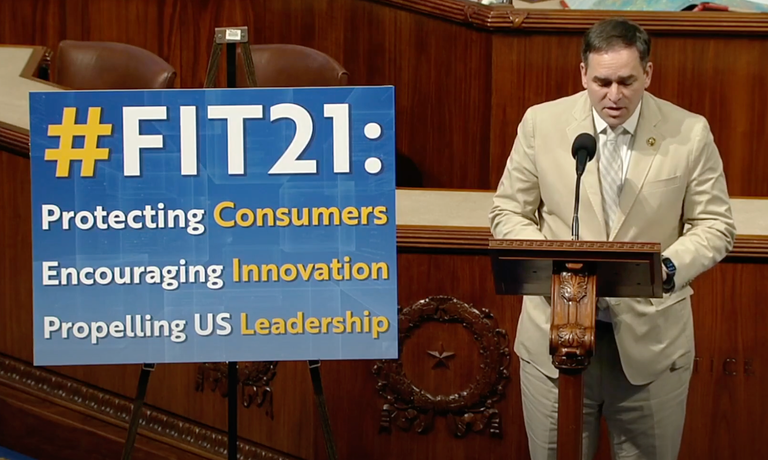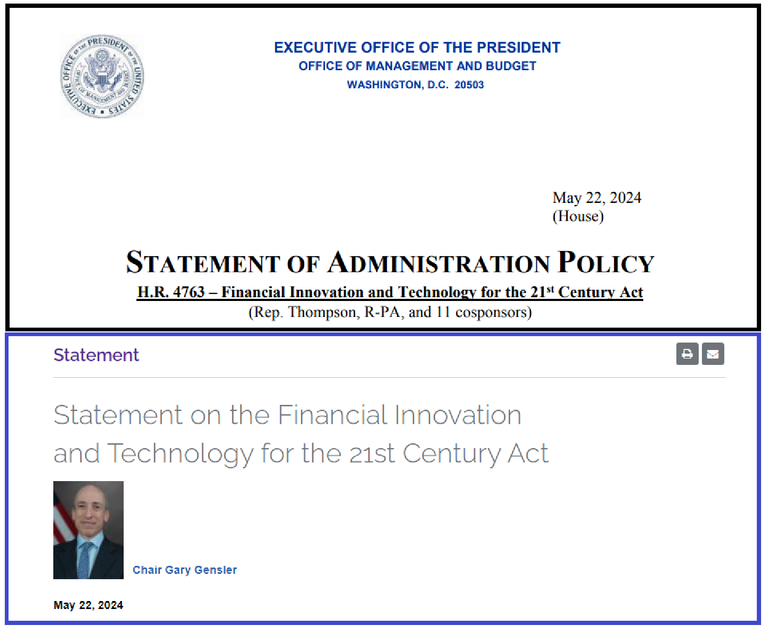KEY FACT: The Financial Innovation and Technology for the 21st Century Act (FIT 21) is up for voting today May 22 on the floor of the U.S. Congress as H.R. 4763. The bill would clarify how the Securities and Exchange Commission (SEC) and Commodity Futures Trading Commission regulate cryptocurrencies and other digital assets. While industry players and some lawmakers are in support of the bill, the U.S. President and SEC Chair oppose its passage.

Source: YouTube
Financial Innovation and Technology for the 21st Century Act (FIT 21)
The Financial Innovation and Technology for the 21st Century Act (FIT 21) is up for voting on May 22 in the U.S. House of Representatives coded as H.R. 4763. The bill would clarify how the Securities and Exchange Commission (SEC) and Commodity Futures Trading Commission regulate cryptocurrencies and other digital assets. According to a statement by the U.S. SEC, the FIT 21 bill provides for the following:
- To remove investment contracts that are recorded on a blockchain from the statutory definition of securities and the time-tested protections of much of the federal securities laws.
- To allow issuers of crypto investment contracts to self-certify that their products are a “decentralized” system and then be deemed a special class of “digital commodities” and thus not subject to SEC oversight. However, the SEC would only have 60 days to review and challenge the certification that a product is a digital commodity.
- A regulatory structure that could change the 90-year-old Howey test — a legal standard for determining what assets are securities — and take crypto mostly out of the SEC’s oversight.
- To replace Roosevelt’s investor protection framework with fewer protections than investors are afforded in every other type of investment. This would apply to those crypto investment contracts that would still fall under the SEC’s remit.
- To exclude crypto asset trading systems from the definition of an exchange and thus remove, for investors on crypto asset trading platforms, the protections that benefit investors on registered exchanges.
- To create an exemption from regulation under the FIT 21 Act for any entity or organization that falls under a broadly defined category called “Decentralized Finance.”
The FIT 21 bill has been welcomed by the crypto industry, with many claiming it clears the currently clouded regulatory framework for digital assets. Rep. Nickel, in support of the bill, says it will “prevent the next FTX” from happening, harping that the hundred-year-old securities law may not be very appropriate for today's realities, owing to the massive technological and social development over the years. he furthered that “Congress has never voted on a regulatory structure for crypto.”
In further support for the passing of FIT 21 bill, many industry leaders and lawmakers have suggested a lack of regulatory clarity in the crypto space, leading to some companies leaving the United States or staying and risking SEC enforcement actions. There are indications that former United States House of Representatives Speaker, Nancy Pelosi is reportedly mulling support for the Republican-led crypto bill.

Source: Screenshots of statements
On the contrary, the White House and SEC chair oppose the FIT21 bill ahead of the House vote. President Joe Biden has already used a statement of administration policy on the matter, clearly stating his administration's disapproval of the bill, emphasizing the need for future collaboration with Congress on developing legislation for digital assets that includes adequate guardrails for consumers and investors while creating the conditions needed for innovation.
The Administration opposes passage of H.R. 4763, which would affect the regulatory structure for digital assets in the United States. The Administration is eager to work with Congress to ensure a comprehensive and balanced regulatory framework for digital assets, building on existing authorities, which will promote the responsible development of digital assets and payment innovation and help reinforce United States leadership in the global financial system. H.R. 4763 in its current form lacks sufficient protections for consumers and investors who engage in certain digital asset transactions. source
The tone of the President's statement suggests that President Biden might consider a veto of the FIT21 bill if passed, which he also said he would do with H.J.Res. 109, a joint resolution countermanding an SEC accounting rule on banks handling cryptocurrencies.
On his part, SEC Chair, Gary Gensler has expressed opposition to the crypto-focused legislation in a statement published on May 22. In his statement, Gensler emphasized that FIT21 poses great risks and would fail to protect the investors as well as the U.S. Capital markets.
The Financial Innovation and Technology for the 21st Century Act (“FIT 21”) would create new regulatory gaps and undermine decades of precedent regarding the oversight of investment contracts, putting investors and capital markets at immeasurable risk. Source.
The SEC Chair further explains that the crypto industry’s record of failures, frauds, and bankruptcies is linked to the failure of key players in the crypto industry to play by the rules.
FIT 21 Bill: The Breakpoint for Crypto Regulation and Adoption
With the back-and-forth views of FIT21, it is evident that this bill will be a breakpoint for crypto regulation and adoption. The passage of the bill would open a future where more investors and institutions would embrace crypto without fear of harsh anti-government regulations. However, a clampdown on this bill would mean that crypto would be mulled further.
However, if this bill passes, crypto enthusiasts has extra work to do to embrace truly decentralized and secure crypto projects to avoid scams and bankruptcy.

If you found the article interesting or helpful, please hit the upvote button, and share for visibility to other hive friends to see. More importantly, drop a comment below. Thank you!
This post was created via INLEO, What is INLEO?
INLEO's mission is to build a sustainable creator economy that is centered around digital ownership, tokenization, and communities. It's Built on Hive, with linkages to BSC, ETH, and Polygon blockchains. The flagship application: Inleo.io allows users and creators to engage & share micro and long-form content on the Hive blockchain while earning cryptocurrency rewards.
Let's Connect
Hive: inleo.io/profile/uyobong/blog
Twitter: https://twitter.com/Uyobong3
Discord: uyobong#5966
Posted Using InLeo Alpha